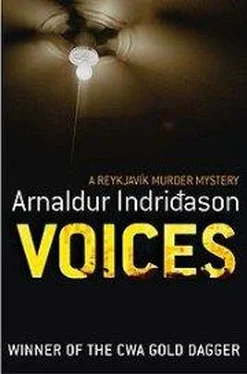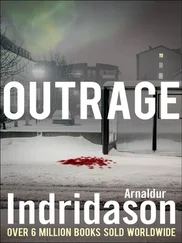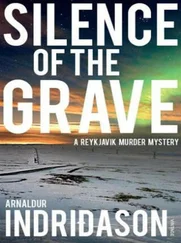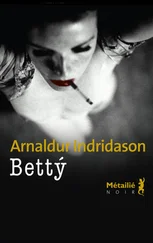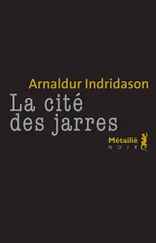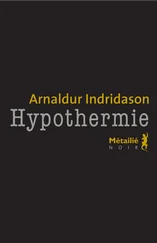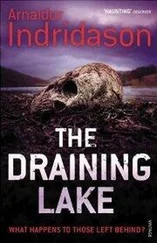“I’d so like to meet you again,” he said, “but I understand if you can’t be bothered.”
Again there was a knock on the door, harder this time.
“I wanted to tell you the truth about that deaths and ordeals business,” Erlendur said. “If you can be bothered to listen.”
“What do you mean?”
“Do you fancy that?”
He didn’t know himself exactly what he meant Why he wanted to tell this woman what he had never told anyone but his daughter before. Why he would not wind up the matter, get on with his life and let nothing disturb it, not now or ever.
Valgerdur did not answer immediately, and there was a third knock on the door. Erlendur put down the phone and opened the door without looking outside to see who was there; he assumed it could only be Eva. When he picked up the telephone again, Valgerdur had gone.
“Hello,” he said. “Hello?” There was no reply.
After putting down the receiver again, he turned around. In his room stood a man he had never seen before. He was short, wearing a thick, dark blue winter coat and a scarf, with a blue peaked cap on his head. Drops of water glittered on his cap and coat where the snow had melted. He was fairly fat-faced with thick lips, and enormous, dark bags beneath small, tired eyes. He reminded Erlendur of photographs of the poet W. H. Auden. A drip hung from the end of his nose.
“Are you Erlendur?” he said.
“Yes.”
“I was told to come to this hotel and talk to you,” the man said. He took off his cap, tapped it against his coat and wiped the drip from his nose.
“Who told you that?” Erlendur asked.
“Someone by the name of Marion Briem. I don’t know who that is. Something about the Gudlaugur Egilsson investigation and talking to everyone who knew him in the past. I used to know him and that Marion told me to talk to you about it.”
“Who are you?” Erlendur said, trying to recall where he had seen his face before.
“My name’s Gabriel Hermannsson and I used to conduct the Hafnarfjordur Children’s Choir once,” the man said. “May I sit down on the bed? Those long corridors…”
“Gabriel? Be my guest. Have a seat.” The man unbuttoned his coat and loosened his scarf. Erlendur picked up one of Gudlaugur’s record sleeves and looked at the photograph of the Hafnarfjordur Children’s Choir. The choirmaster stared cheerfully into the camera. “Is this you?” he asked, handing him the sleeve.
Gabriel looked at the sleeve and nodded.
“Where did you get that?” he asked. “Those records have been unavailable for decades. I stupidly lost mine somehow or other. Lent it to someone. You should never lend anything.”
“It belonged to Gudlaugur,” Erlendur said.
“I’m only, what, twenty-eight there,” Gabriel said. “When the photo was taken. Incredible how time flies”
“What did Marion say to you?”
“Not much. I said what I knew about Gudlaugur and was told to talk to you. I was coming to Reykjavik anyway so I thought it would be ideal to use the opportunity.”
Gabriel hesitated.
“I couldn’t quite tell from the voice,” he said, “but I was wondering whether it was a man or a woman. Marion. I thought it would be rude to ask but I couldn’t make up my mind. Normally you can tell from the voice. Funny name. Marion Briem.”
Erlendur discerned in his voice a note of interest, almost eagerness, as if it mattered to know.
“I’ve never thought about that,” Erlendur said. “That name. Marion Briem. I was listening to this record,” he said, pointing to the sleeve. “His voice has a strong effect, there’s no denying that. Considering how young the lad was.”
“Gudlaugur was probably the best choirboy we ever had,” Gabriel said as he looked at the sleeve. “In retrospect. I don’t think we realised what we had in our hands until much later, maybe not even until only a few years ago.”
“When did you first get to know him?”
“His father brought him to me. The family lived in Hamarfiordur then, and still do, I think. The mother died a little while later and he brought the children up entirely by himself: Gudlaugur and a girl who was some years older. The father knew that I’d just got back from studying music abroad. I taught music, private lessons and other things. I was appointed choirmaster when I managed to round up enough children to form a choir. It was mostly girls, as always, but we advertised specially for boys and Gudlaugur’s father brought him to my house one day. He was ten at the time and had a wonderful voice. That wonderful voice. And he knew how to sing. I could tell straight away that his father made great demands on the boy and was strict with him. He said he’d taught him everything he knew about singing. I later found out that he was hard on the boy, punished him, kept him indoors when he wanted to go out and play. I don’t think you could call it a good upbringing because so much was expected of him and he wasn’t allowed to hang around with friends much. He was a classic example of parents taking control of their children and trying to turn them into what they want. I don’t think Gudlaugur had a particularly happy childhood.”
Gabriel stopped.
“You’ve wondered about this quite a lot, haven’t you?” Erlendur said.
“I just saw it happening.”
“What?”
“Strict discipline and unwavering demands can have an awful effect on children. I’m not talking about discipline when children are naughty and need restraint or guidance, that’s a completely different matter. Of course children need discipline. I’m talking about when children aren’t allowed to be children. When they’re not allowed to enjoy being what they are and what they want to be, but are shaped and even broken to make them something different. Gudlaugur had this beautiful boy soprano and his father intended a big role for him in life. I’m not saying that he treated him badly in a conscious, calculated way, he just deprived him of his life. Robbed him of his childhood.”
Erlendur diought about his own father who did nothing but teach him good manners and show him affection. The single demand he made was to behave well and treat other people kindly. His father had never tried to turn him into anything he was not. Erlendur thought about the father who was awaiting sentence for a brutal assault on his own son, and he imagined Gudlaugur continually trying to live up to his father’s expectations.
“Maybe we see this most clearly with religion,” Gabriel continued. “Children who find themselves in certain religions are made to adopt their parents” faith and in effect live their parent’s lives much more than their own. They never have the opportunity to be free, to step outside the world they’re born into, to make independent decisions about their lives. Of course the children don’t realise until much later, and some never do. But often when they are adolescents or grown-up, they say: “I don’t want this any more”, and conflicts can arise. Suddenly the child doesn’t want to live its parents” life, and that can lead to great tragedy. You see it everywhere: the doctor who wants his child to be a doctor. The lawyer. The company director. The pilot. There are people all over the place who make impossible demands of their children.”
“Did that happen in Gudlaugur’s case? Did he say, “This is where I draw the line”? Did he rebel?”
Gabriel waited before replying.
“Have you met Gudlaugur’s father?” he asked.
“I spoke to him this morning,” Erlendur said. “Him and his daughter. They’re full of some kind of anger and antipathy and they clearly didn’t have any warm feelings for Gudlaugur. They didn’t shed a tear for him.”
“And was he in a wheelchair? The father?”
Читать дальше
